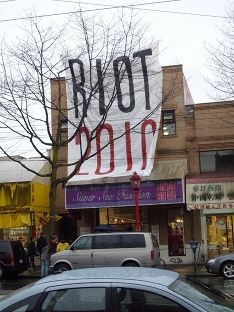Anti-Olympic Activists Stalk World Press
Anti-Olympic activists woo world press attention in Vancouver
Tuesday, November 18, 2008
The Canadian Press/CBC News
As the international press learns this week how much it will cost to cover the 2010 Winter Games, activists hope they will also learn how much the Olympics are costing Vancouver.
A three-day world press briefing, which began in Vancouver Tuesday, will see over 200 members of the media touring Olympic venues, wooed by tourism officials and learning the nuts and bolts of covering the Games.
At the same time, community groups are holding their own briefings in an attempt to garner international attention for issues like homelessness, the encroachment of native rights, and the environmental destruction they say are also part of the Olympics.
'We want to enlighten people as to what's happening.'— Garth Mullins, Olympic Resistance Network
"Because media are going to be going to the actual events themselves, it's also an opportunity for [the organizing committee] to explain the benefits of the Games and what's going to be happening over the course of three weeks," said Am Johal of Impact on Community Coalition, a group that doesn't oppose the Olympics but is pushing for more inclusion by local residents.
"Because international media are here they should get the full story of what's actually happening here."
By one count, over 1,300 affordable housing beds have been lost in Vancouver since the Games were awarded and the number of homeless has continued to rise.
The local organizing committee has already committed half of its $500,000 budget to try and alleviate housing concerns during the Games by funding additional beds at a youth shelter.
They are also turning a number of beds from the Olympic Village over for sustainable housing after the Games end.
No place for community groups: organizing committee
While Johal, along with local legal and civil rights advocates, didn't ask for a place at the press briefing table, they said they felt they should have a spot so they can tell international reporters about the local issues.
But a spokeswoman for the organizing committee said the briefing is not the place for community groups to have a role, and most of the journalists are not there to file stories.
"They are here to understand where they are going to plug their computers in, where they will be staying, where will they get their meals," said Renee Smith-Valade, vice-president of communications.
While the Impact on Community Coalition held a small, sparsely attended press conference Tuesday morning to outline their concerns, other groups were more direct.
Members of the Olympic Resistance Network, which opposes the Games entirely, handed out press kits and flyers to reporters going in and out of the convention centre where the briefing meetings are taking place.
They'll also be holding their own press conference on Thursday in Vancouver's notorious Downtown Eastside.
Network member Garth Mullins said his group doesn't want to see the poverty-stricken neighbourhood exploited "to make sexy TV," while there are so many issues there.
"We want to enlighten people as to what's happening," Mullins said.
"I think a lot of people from around the world when they visit Vancouver are very surprised to see this particular postal code in the midst of so much of an economic boom and I think the international media might likewise be surprised."
